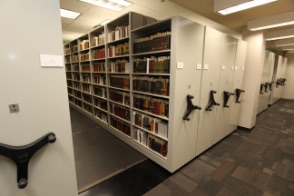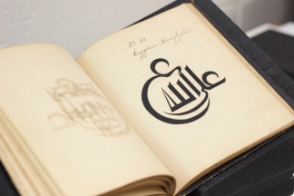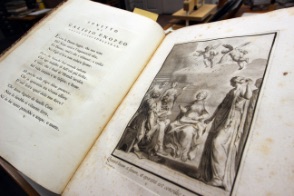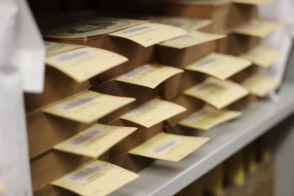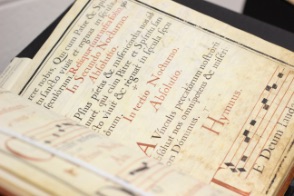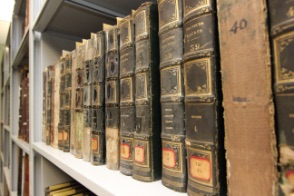Committed to Preservation
Renovated in 2015, the Special Collections room offers high-density shelving and increased temperature and security controls for storing rare books. The storage room is monitored daily by preservation staff to ensure the safety and long-term preservation of the collections.
Our staff members are specialists in the field of book and paper conservation and, above all, uphold a dedication to preserving library collections through preventative care and minimal intervention to maintain historical integrity while allowing safe accessibility for readers. All treatments performed by the preservation staff comply with the Code of Ethics and Guidelines for Practice of the American Institute for Conservation of Historic and Artistic Works.
All treatments performed by preservation staff comply with the Code of Ethics and Guidelines for Practice of the American Institute for Conservation of Historic and Artistic Works.
Library Preservation Policy
The Rare Book Collection at Belmont Abbey College consists of over 13,000 books, manuscripts, hand-colored prints, photographs, ephemera, and a notable collection of early printing techniques, including incunabula dating back to 1474. The collection includes books on theology, scripture, history, and literature, as well as Catholicism in the American South. The Rare Book Rooms also house valuable objects from the monastery such as chalices, textiles, and large scale sculpture. These varied special collections are vital to the Abbey’s heritage and preserving them for future generations of researchers is essential to the mission of the College. Aside from the Rare Book Collection, the library has more than 130,000 print books in its reference and circulating collections and is available to 90,000 college community and off-campus patrons a year. Long term preservation of these collections is, then, a library wide responsibility. Both preservation and library staff should, therefore, be dedicated to ensuring sufficient access to materials for current and future generations by demonstrating good preservation practices in their daily responsibilities. In this way, staff can have a positive impact on students and consequently foster a greater respect for the library and its collections.
The Preservation program, thus, maintains above all a dedication to preserving library collections through preventative care and minimal intervention in order to maintain an object’s historical integrity and to allow safe accessibility for readers. Staff are responsible for recognizing risks to library materials and for making informed and ethical decisions for the future care of special collections. All treatments undertaken by the preservation specialist or trained assistants must adhere to the Code of Ethics and Guidelines for Practice of the American Institute for Conservation of Historic and Artistic Works.
In keeping with the preservation program’s standards of providing stable, long-term access to information, consideration will also be given to electronic formatting of items of specific interest or relevance to library collections. The preservation program, then, also includes a digital curation initiative covering both born-digital content and content scanned into digital form from print originals. Through active participation in the DigCCurr Digital Curation Institute at UNC-Chapel Hill and in accord with the goals and objectives of the Catholic Research Resources Alliance (CRRA), the Library will continue to undertake systematic curation of selected data files deemed to be of special significance.
The following objectives are the central focus of the preservation program at Belmont Abbey College, and the activities involved in each area will be adhered to so far as resources, staffing, and budget allow.
- Security Measures: Enforce appropriate security measures for the Rare Book Rooms, by ensuring that readers, interns, or work-study students leave bags and ID at the circulation desk while working. Uphold a no food or drink policy in the rooms, and ensure that pencils only are available to readers. Bags, purses and backpacks belonging to users must be checked by circulation manager upon departure.
- Safe Handling Training: Provide instruction to staff, students, faculty, and public patrons on how to handle books properly. This includes safely removing books from shelves, appropriately re-shelving books, and providing book wedges for special collections.
- Environmental Control: Establish stable environments for collection storage by monitoring relative humidity and temperature in rooms on a daily basis. Measure changes in RH and temperature through a maintenance log and adjust major fluctuations through the HVAC system or portable humidifiers. Maintain a regular housekeeping schedule to eliminate dust and surface dirt on collections, and to check for signs of mold or damaged materials.
- Preventative Care: Consult contemporary conservation standards and employ the most effective preservation options for storage. Keep original formats whenever possible, and rehouse special collections as needed and in order of priority with non-damaging materials such as archival boxes, folders, or cabinets. Recommend items for new digital formats when necessary to maintain accessibility. Items undergoing digitization take priority for rehousing and conservation treatment. Isolate damaged books from open shelving, evaluate the extent of the damages and determine what materials go to the outside binder.
- Conservation Repair: Provide detailed examinations of damaged objects and thorough documentation through conservation reports, including photographs. Document treatment plans, and maintain a policy of minimal intervention with visible, removable repairs. Apply only researched and universally accepted conservation methods and techniques. Repairs should not interfere with the object’s historical integrity and no interventive measures should be taken when materials are unsuitable for repair. Consult outside conservation professionals in the case of non-library materials such as decorative objects and sculpture.
- Emergency Response: Maintain an up-to-date emergency response plan, stock emergency supply cupboards, and train staff on what to do in the event of an emergency. Provide training for select staff in emergency salvage of library materials and respond to emergencies that threaten special collections.
- Exhibitions: Monitor the length of exhibitions and suitability of display cases. Use copies of originals when available, and ensure the safety of exhibition materials by providing secure, archival object mounts and proper low-level light sources. Maintain appropriate RH and temperature levels in display cases and exhibit cases in secure areas where there is limited natural light.
- Digital Content Curation: The initial focus of the digital curation program includes:
- content scanned into digital form from print originals in the Fr. Abram J. Ryan Archive, the Ralph Ray, Jr. Archive, and the Rare Books Online Exihibition;
- content submitted by faculty for inclusion in an institutional repository (Digital Scriptorium);
- content scanned from College publications, such as yearbooks and Crossroads; and
- selective eportfolio content compiled by students in support of their academic majors.
The technical specifics of the curation program (software, storage, error-check utilities, etc) are to be developed in collaboration with the College IT department and in consultation with CRRA technical coordinators at peer institutions.
The preservation specialist is available to provide training for staff whenever necessary on preservation practices and techniques, and the Preservation Policy for the library will be at all times accessible through the website or in print for reference.
BE BLESSED BY THE ABBEY
The very nature of the liberal arts education has made me a better-rounded person by strengthening my communication skills and fostering exploration of subjects outside my major. As I start my new job at a library headquarters, I will bring with me everything I have learned from both my classes and my friendships, and I could not be more grateful for the blessing of my years at the Abbey.
JESSIE BRUSHABER 2014
English

